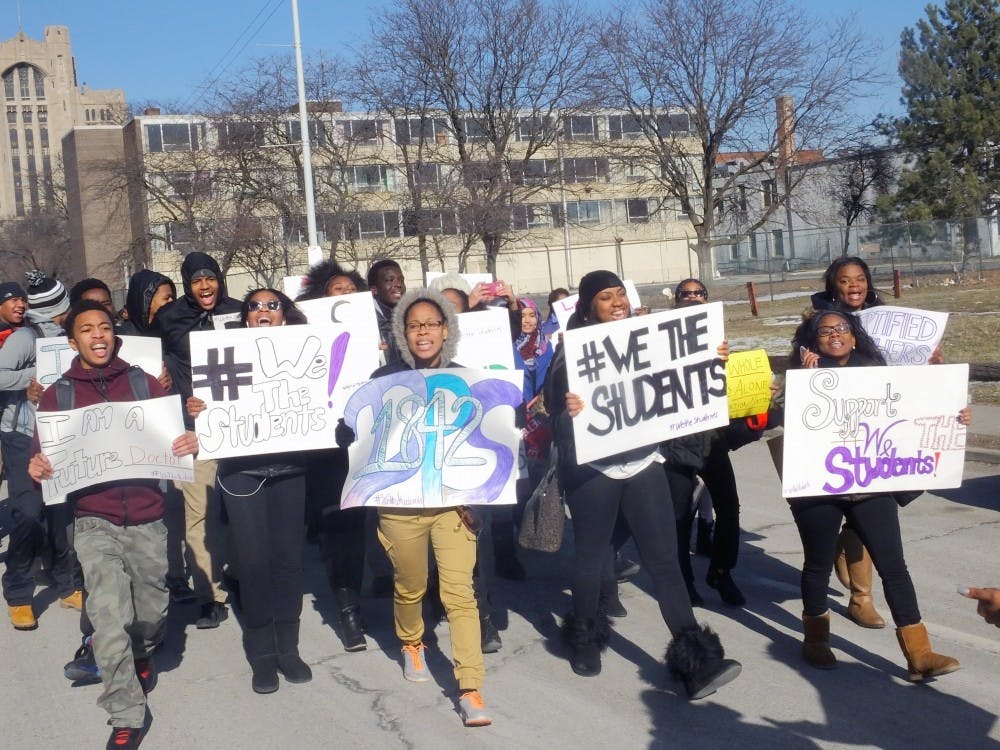Dilapidated schools. Discolored water. Overcrowded classrooms. Compromised health.
Michigan Gov. Rick Snyder and Detroit Public Schools Emergency Manager Darnell Earley have become household names in recent weeks due to the lead infested water in Flint and school conditions in Detroit. These issues have gotten national attention, donations of school supplies being sent to Detroit and water filters being sent to Flint. However, these crises did not start recently.
Detroit Public Schools
Financial issues within Detroit Public Schools have been ongoing for years prior to Earley’s arrival. In 1999, a reform board was enacted by then-Governor John Engler to improve administration of the district. DPS then had a surplus of $100 million. However, in 2005, Detroiters voted to select a new board to fix a new deficit exceeding $200 million.
In March 2009, Robert Bobb, former first president of the Washington D.C. Board of Education, was appointed as Emergency Manager of DPS. The district has had three emergency managers since, Earley being most recent. The deficit of the DPS budget skyrocketed to $1.66 billion during the 2015 fiscal year.
Besides the images of bullet holes, dilapidated ceilings, and mold and fungi growing out of school walls that have spread across the internet, DPS employees have been experiencing 10% pay cuts over the past five years. Earley and Snyder have been silent to the requests of Detroit teachers for better pay, smaller class sizes, and even basic resources such as toilet paper and hand sanitizers.
The teachers of DPS have taken action against the district in the form of “sickouts,” or teachers using sick days to stay home from work. The most prominent sickout was on January 22, where 88 out of the district’s 104 schools were closed. Students from high schools such as Cass Tech, Renaissance, Communication and Media Arts High, and East English Village have also taken it upon themselves to protest for better working and learning conditions through school walkouts.
“They [the students] are protesting the terrible conditions in DPS, in general, while supporting their teachers,” Cass Tech English Teacher Vicki Green said. “I guess even young folks can become ‘sick and tired’.”
Snyder said, “[The] time to act is now; Detroit Public Schools are in need of a transformational change,” during his State of the State Address last month. Snyder is also asking for $72 million to be spent on repairing DPS over the next ten years. Yet, is DPS on the road to recovery?
Flint
Flint’s crisis began in April 2014 when the city changed its water source from Detroit’s water system to the Flint River to save about $100 a day, a plan implemented by Earley. After switching, residents in Flint complained about the taste, color, and odor of the water, but were told that it was safe to drink.
It wasn’t until months after the switch that residents were given water boiling advisories. In January, Flint council members called for a switch back to Detroit water after finding out Flint is in violation of the Safe Drinking Water Act. Earley declined, even when the Detroit Water and Sewerage Department offered to reconnect without a fee.
In September, Virginia Tech professors found that lead had leached into water due to the water’s corrosiveness. Children from Flint were also tested and some were found with elevated levels of lead in their blood. However, a public health emergency about lead levels was not announced until October 1. Governor Snyder then finally took action towards the water crisis and committed $1 million to pay for water filters. On October 8, Snyder finally decided to switch Flint back to Detroit’s water system.
However, the issues with the water still persist. Many residents did not receive clean water and water filters until January 2016, Snyder not declaring a state of emergency until January 5.
“This could have been prevented for $100 a day,” Cass Tech senior Mike Farmer said during Cass Tech’s broadcast show, Tech Talk.
While many Michigan residents are sickened by the severity of the crisis, other students have found the “silver lining” in this situation.
‘Even though there has been a lot of bad stuff going on, it’s also a lot of good going on too,” Cass Tech senior Darius Boatner stated also during Tech Talk. “We’ve seen how people [can] come together… Also, we, Cass Tech students, donated several bottles of water, our whole lobby was filled with water.” He said in regards to Cass Tech’s water donation to Flint.
Earley is to resign from emergency manager of both Flint and DPS at the end of February.



